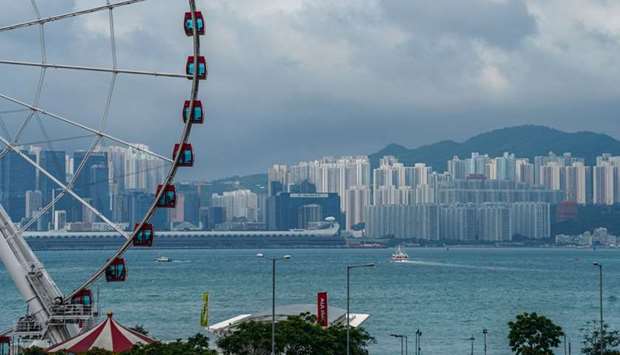Hong Kong told the United States to keep out of the debate over national security legislation being imposed by China, and warned that withdrawal of the financial hub’s special status under US law could backfire on the US economy.
President Donald Trump is due to announce later yesterday his response to the Chinese parliament’s advancement this week of security legislation for Hong Kong, which many lawyers, diplomats and investors fear could erode the city’s freedoms.
The former British colony has been racked by civil unrest amid fears Beijing is curbing the high degree of autonomy it has enjoyed under a “one country, two systems” formula adopted when it returned to Chinese rule in 1997.
“Any sanctions are a double-edged sword that will not only harm the interests of Hong Kong but also significantly those of the US,” Hong Kong’s pro-Beijing government said late on Thursday. From 2009 to 2018, the US trade surplus of $297bn with Hong Kong was the biggest among all Washington’s trading partners, and 1,300 US firms were based in the city, it said.
Beijing says the new legislation, likely to come into force before September, will tackle secession, subversion, terrorism and foreign interference in the city.
It could see Chinese intelligence agencies set up bases in Hong Kong.
China’s Ministry of Public Security (MPS) said it would “direct and support Hong Kong police to stop violence and restore order”. Hong Kong’s police have been independent from China and the MPS has no enforcement powers in the city.
Riot police fired pepper pellets this week to disperse thousands of protesters in the city’s first major unrest since anti-government demonstrations paralysed it for months last year.
There had been a lull in the agitation partly as a result of the coronavirus outbreak earlier this year. Chinese authorities and Hong Kong’s government say the legislation poses no threat to the city’s autonomy and the interests of foreign investors would be preserved.
Reacting to US efforts to call a UN Security Council meeting over Hong Kong, China’s foreign ministry reiterated yesterday that Hong Kong was an internal affair and no country had the right to interfere.
It said China has lodged solemn representations to countries condemning its plans and was determined to take countermeasures against any US actions.
Trump’s top economic adviser, Larry Kudlow, warned that Hong Kong, which has enjoyed special privileges under US law on the basis of its high degree of autonomy from Beijing, may now need to be treated like China on trade and other financial matters. The State Department said it could “no longer certify that Hong Kong continues to warrant (differential) treatment” from Beijing.
The Fitch ratings agency said it expected Hong Kong’s economy to contract by 5% this year, in large part because of the coronavirus, and the outlook for the operating environment for its banks was negative. Hong Kong’s Hang Seng index, which has lost about 3% after the news of the security legislation, was down 0.7% as worries over US-China tensions unsettled markets globally. Many Hong Kong residents feel their city is on the cusp of historic change.
“No matter how it turns out, I’ll always stand on the people’s side,” said Samantha Tam, 27. The office worker said the uncertainty had made her put on hold plans to have a baby. “When Hong Kong really loses special status, China will see the consequences. I just want to burn together,” she said, paraphrasing a protest slogan aimed at Beijing: “If we burn, you burn with us.”
Hong Kong’s Beijing-backed leader, Carrie Lam, urged citizens to “join hands to pursue our dreams while putting aside our differences”, in a statement published in newspapers.

The Hong Kong Observation Wheel stands along the waterfront as buildings stand across Victoria Harbour. Hong Kong told the United States to keep out of the debate over national security legislation being imposed by China, and warned that withdrawal of the financial hub’s special status under US law could backfire on the US economy.
